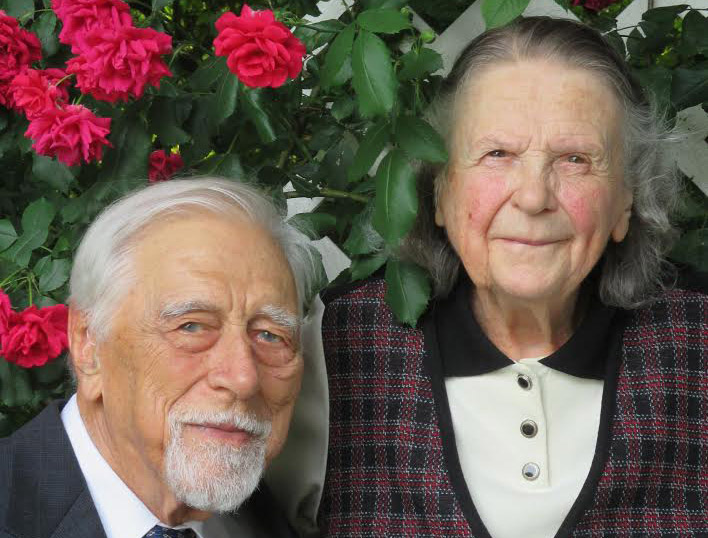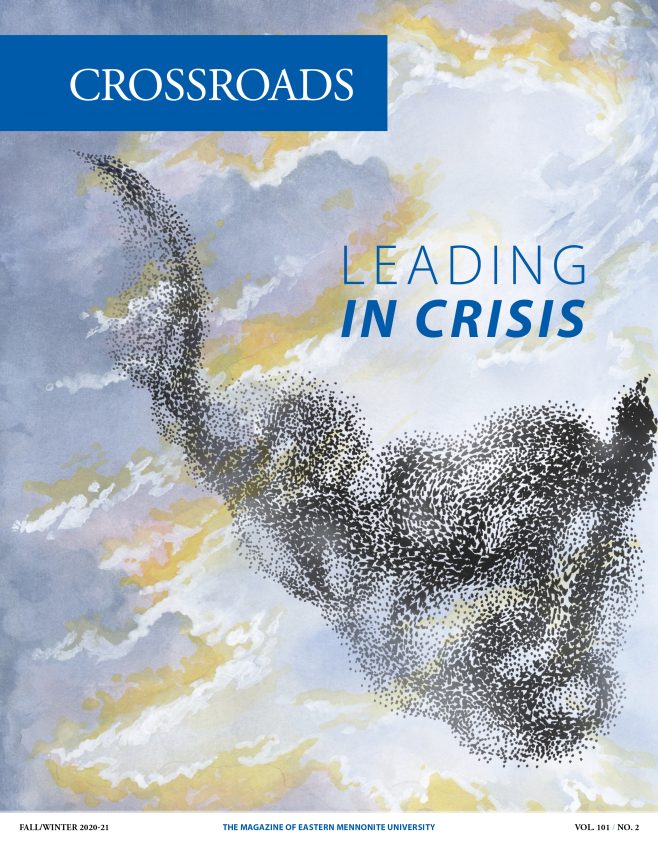
When Chester Wenger ’36 became acquainted with Sara Jane Weaver ’42, he found her “so beautiful and loveable I couldn’t resist,” he said with a twinkle in his eye. Something else beguiled Chester. “It impressed me to see a young woman stand up there teaching the Bible to a whole roomful of children,” holding their rapt attention. A shared interest in spreading God’s story became the bedrock of a love still luminous as the couple, now 99 and 94 and going on 73 years of marriage, banter about their past.
“What better way to celebrate our centennial than to create a special Centennial Alumni Award to recognize persons who have defined the ethos of EMU in a sustained way for a lifetime,” said President Susan Schultz Huxman. “Chester and Sara Jane Wenger were unanimously selected by our committee as alumni who have lived rich lives of service, leadership and faith and defined our mission with integrity and grace for many decades.”
Each had firm foundations in Mennonite communities. Sara Jane grew up in Lancaster City, Pennsylvania, where her paternal grandfather and parents ran a grocery store and several Central Market stands. Chester’s father, A.D. Wenger, was named president of Eastern Mennonite School when the boy was 4. The family lived on the Harrisonburg campus during the academic year and returned to their farm in Chesapeake, Virginia, to tend the grapevines when school was out. Both of their mothers were influential Bible teachers.
In 1936, Chester graduated from EMS, which then offered high school and two-year associate’s degrees. He earned a bachelor’s degree in biology at nearby Bridgewater College. After a year of driving a milk delivery route, Chester returned to Eastern Mennonite School to take advantage of its new offering, an additional year of Bible studies. From childhood, Chester yearned to know the Bible, even in an era when pastors, including his two older brothers, were called by lot or vote and didn’t need theological training. In that 1940-41 school year, he met Sara Jane, a first-year student.
Sara Jane had taught in summer Bible school from the age of 13, traveling as far as Paoli, 60 miles east of Lancaster City, to do so. “I loved to teach,” she said. “I told stories to get their attention and I didn’t want a single child to drop out. I knew each one by name.”
Chester returned to Chesapeake in 1941 and converted an old store into a primary school, part of a Mennonite movement “because the country was getting ready for war and we didn’t want our children to learn war,” he said. When Sara Jane graduated in 1942 with an associate’s in elementary education, she joined Chester’s sister Ruth in the two-room schoolhouse and taught the lower grades. “The local Mennonite community fell in love with her just like I did,” Chester said.
They were “friends and courting” but not yet engaged. As Sara Jane settled into Chester’s home community, Chester was sent to Grottoes, Virginia, to a Civilian Public Service (CPS) camp, a legal alternative to military service for conscientious objectors. He worked for 18 months in soil conservation, then transferred to a center for developmentally disabled children in Vineland, New Jersey. Sara Jane joined Chester in Vineland after their July 1944 marriage. They became house parents for 35 adolescent boys. In 1945, Chester was transferred to Gulfport, Mississippi, to join a CPS hookworm-elimination project. Their first child, Betty, was born there.
After the war, the couple, now with three daughters under 4, settled in Chester’s Chesapeake home community, was asked to move to Ethiopia as educational missionaries. In that Horn of Africa country, they lived at a mission compound with a hospital and school for nurses’ aides in Nazareth, some 60 miles southeast of Addis Ababa. When the government permitted the missionaries to teach Bible in the training school, Chester converted a warehouse into a dormitory and classroom and opened the Dresser Bible School in 1952. Other persons, mostly from EMU, joined the mission team. The Ethiopian Mennonite Church, Meserete Kristos, today numbering close to a half million, emerged from this effort.
While Chester opened schools, Sara Jane homeschooled Betty, Margaret and Jewel. The couple also welcomed two new babies into the family, Chet and Sara.
As their five years drew to a close, Orie Miller, secretary of Lancaster Mennonite Conference’s mission board, asked Chester to use their furlough for seminary studies. He graduated from Union Theological Seminary in Richmond, Virginia, in 1956.
They returned to Ethiopia with six children, son Mark having been born during their leave. They temporarily lived in Addis Ababa to fill in for the mission director while he took a furlough. Then it was back to Nazareth for Chester’s assignment of starting a training academy for the emerging Ethiopia Mennonite Church. He eagerly anticipated this opportunity. The government gave permission in 1959 to start this secondary school, the Nazareth Bible Academy. Sara Jane organized the library and taught piano and typing. During this term their last two children were born, Phil and Tom.
In 1966, now with eight children and after 17 years of mission, Chester and Sara Jane returned to the United States. Chester became secretary of home ministries and evangelism for Lancaster Mennonite Conference, based in Salunga, Pa., and working with church plantings from Maine to Florida. He worked 13 years in the position, with highlights being initiation of a Paul- Timothy mentorship program and the 1971 creation of Keystone Bible Institutes. Keystone seminars brought in professors from EMU, Goshen and other Anabaptist colleges for a week at a time. “I was concerned that we had no trained seminary people in Lancaster Conference,” Chester said.
For both Sara Jane and Chester, used to living in a compound and sharing mission work and family life throughout the day, the readjustment to life in the States, with compartmentalization of work and home, was a challenge. Chester now spent long hours at an office. Eventually Sara Jane trained to become a remedial reading tutor for children and worked in that profession for 17 years.
In 1981, the couple accepted the invitation to pastor Blossom Hill Mennonite Church in Lancaster. They stepped down in 1991 but still attend.
The Wengers gained attention in 2014 after Chester married their gay son and his longtime partner. The fact that Phil told them about his orientation as a teenager speaks volumes about the couple’s parenting. A respected doctor told Chester and Sara Jane that same-sex orientation was not a changeable trait. “We walked with our son through a deep valley,” Chester said of the rejection Phil experienced.
In an “Open Letter to the Mennonite Church,” published in the December 2014 issue of The Mennonite, Chester said, “I feel that my act of love in signing a marriage license for our son and his companion was in line with the actions of Peter and Paul who led the church of Christ to welcome the uncircumcised into the fellowship of the family of God.”
Through the ups and downs of their lives, Chester and his “beloved life companion” Sara Jane have remained a united team. “In our work, in our home, as parents, in solving problems, in discerning God’s will, we have worked as a twosome,” Chester said in Bearing Fruit, the couple’s memoir compiled by daughter Betty Wenger ’67 Good-White and granddaughter Deborah Anna Good ’02.
Editor’s note: Seven of Chester and Sara Jane’s children graduated from EMU: Betty Wenger ’67 Good-White, Margaret Wenger ’69 Johnson, Jewel Wenger ’69 Showalter, Sara Wenger ’75 Shenk, Mark Wenger ’79, Philip Wenger ’82, and Thomas Wenger ’82.
